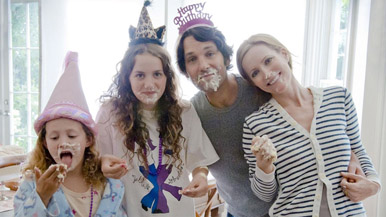Movie Review: This Is 40
By Matthew Huntley
January 10, 2013
BoxOfficeProphets.com

But it’s gotten to the point where I no longer care about this man’s personal life, and I’m no longer interested in his thoughts on sex, marriage, kids, careers, family and the idea of growing old. Apatow has exhausted these themes and now when his characters talk about or face the growing pains of everyday life, it comes off as stress-inducing noise rather than thoughtful or comedic insights into human nature.
Take Pete (Paul Rudd) and Debbie (Leslie Mann, Apatow’s real-life wife), the married couple we first met in Knocked Up and who now have a movie all to themselves with This Is 40. Their marriage exists at one of two extremes: they’re either very angry at each other or madly in love. There’s no middle ground, and it proved tiring to watch them either constantly fight or kiss and make up. In between, they deal with life’s random happenings and struggles, but we always get the sense one of them is about to explode because they’re finally going to realize how incompatible they are as a couple. That uncomfortable, anxious feeling stays with us throughout the film, which may be the point because Apatow wants us to get a sense of how they feel after being married 13 years, but it’s not pleasant to watch and it doesn’t really teach us anything.
Throughout the movie, I kept asking myself, what’s funny here? What’s there to enjoy by watching Pete and Debbie contend with life’s incidental problems? Maybe if we cared about them more, but strangely enough, the movie seems to have contempt for its characters, as if it’s begging Pete and Debbie to call it quits because they’re so cruel to each other. As a result, so are we, and by the end, I wanted Pete and Debbie to put each other out of their misery just so I could be put out of mine.
Some of the points the movie makes are that relationships of any kind are hard to manage and you sometimes want to kill the other person; that our bodies age, a fact we become more sensitive to the older we get; and that it’s difficult to mend old family relationships when only one side seems to be making an effort. We know all this just by having lived, and Apatow liberally throws all of these subjects into the mix, but the problem is that’s all he does. He doesn’t bother saying anything meaningful about them. This Is 40 observes a lot of problems but doesn’t offer any solutions, and so it just seems to run around in circles as we grow restless trying to find a purpose for it. Apatow’s friends and family are likely to chuckle at the material because they’ll see a part of themselves depicted on-screen, but what about the rest of us? The appeal of This Is 40 seems limited to those who know Apatow personally.
The conflicts in the film revolve around Pete and Debbie as they both turn 40 in the same week. Debbie opts to deny it and tells people she’s actually 38, but not without first smoking a cigarette to mitigate the pain of the truth. Pete is less concerned about his age than his business. He started his own music label and he’s been foolishly banking on Graham Parker’s latest album to secure a big payoff, but when that doesn’t happen, he finds himself approaching financial ruin and is afraid to tell Debbie they may have to sell their upscale Los Angeles home, which, by the way, is large and very well furnished. It’s hard to say where they initially got the money to buy such a house and spoil their two kids - Sadie (Maude Apatow) and Charlotte (Iris Apatow) - with every technology device imaginable, but here they are. Perhaps Debbie’s clothing business, where she employs the sexy Desi (Megan Fox) and introverted Jodi (Charlyne Yi), did really well at one point. Now Debbie thinks one of her employees is stealing from her, a plot development that doesn’t really amount to anything.
The movie as a whole doesn’t really amount to anything, either. Not even the supporting cast helps. Albert Brooks plays Pete’s father, a moocher with triplets who always cons his son into giving him money; and John Lithgow plays Debbie’s dad, who’s always been absent from her life and is just now starting to make an appearance, though he’s finding it may be too late to make up for past mistakes.
Perhaps Apatow thought it was enough to simply watch these people, but it’s not. It’s also not enough that his characters are so pop-culturally aware. They’re always talking about things like movies, TV shows and the latest technology. In fact, the iPhone, iPod and iPad are given so much screen time, I thought maybe I was watching a commercial for Apple. Apatow probably figured we’d relate better to the characters if they referenced to and used the same things we do, but I think this will only end up showing the movie’s age a few years down the road.
Normally filmmakers who write themselves into their movies provide a conduit that makes the material just as meaningful to the audience, but the people and world of This Is 40 are too exclusively Apatow-ish. Without some sort of accessibility, I felt left out, and therefore didn’t really care about what I was watching. Apatow is undoubtedly a smart man and he must know a lot about many things, so I encourage him to keep writing about what he knows, but it’s high time he write about something besides his personal life. After four movies, we’ve been down that road too many times.